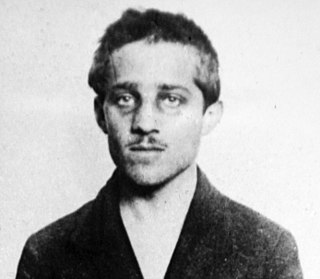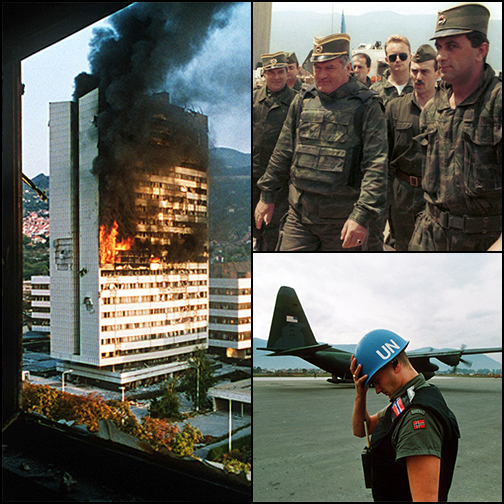
Gavrilo Princip was a Bosnian Serb student who assassinated Archduke Franz Ferdinand of Austria and his wife Sophie, Duchess of Hohenberg, in Sarajevo on 28 June 1914.

Sarajevo is the capital and largest city of Bosnia and Herzegovina, with a population of 275,524 in its administrative limits. The Sarajevo metropolitan area including Sarajevo Canton, East Sarajevo and nearby municipalities is home to 555,210 inhabitants. Located within the greater Sarajevo valley of Bosnia, it is surrounded by the Dinaric Alps and situated along the Miljacka River in the heart of the Balkans, a region of Southern Europe.

The siege of Sarajevo was a prolonged blockade of Sarajevo, the capital of Bosnia and Herzegovina, during the Bosnian War. After initially being besieged by the forces of the Yugoslav People's Army, the city was then besieged by the Army of Republika Srpska from 5 April 1992 to 29 February 1996. It lasted three times longer than the Battle of Stalingrad, more than a year longer than the siege of Leningrad and a few months longer than the siege of Madrid, and was the longest siege of a capital city in the history of modern warfare.

Like the surrounding Balkan countries, Bosnia and Herzegovina has had a turbulent past marked by frequent foreign invasions and occupation. As a result, Bosnian music is now a mixture of Slavic, Turkish, Central European, Mediterranean, and other influences.

The Bosnian War was an international armed conflict that took place in Bosnia and Herzegovina between 1992 and 1995. The war is commonly seen as having started on 6 April 1992, following a number of earlier violent incidents. The war ended on 14 December 1995. The main belligerents were the forces of the Republic of Bosnia and Herzegovina and those of Herzeg-Bosnia and Republika Srpska, proto-states led and supplied by Croatia and Serbia, respectively.

Young Bosnia was a revolutionary movement active in the Condominium of Bosnia and Herzegovina, Austria-Hungary before World War I. Its members were predominantly young male students, primarily Bosnian Serbs, but it also included Muslims and Croats. There were two key ideologies promoted amongst the members of the group—the Yugoslavist and the Pan-Serb. Philosophically, Young Bosnia was inspired by a variety of ideas, movements, and events, such as German romanticism, anarchism, Russian revolutionary socialism, Fyodor Dostoevsky, Friedrich Nietzsche, and the Battle of Kosovo.

The United Nations Protection Force was the first United Nations peacekeeping force in Croatia and in Bosnia and Herzegovina during the Yugoslav Wars. The force was formed in February 1992 and its mandate ended in March 1995, with the peacekeeping mission restructuring into three other forces.

Bugojno is a town and municipality located in Central Bosnia Canton of the Federation of Bosnia and Herzegovina, an entity of Bosnia and Herzegovina. It is situated on river Vrbas, 130 km (81 mi) to the northwest from Sarajevo. According to the 2013 census, the town has a population of 15,555 inhabitants, with 31,470 inhabitants in the municipality.

Šamac, formerly Bosanski Šamac is a town and municipality located in the northeastern part of Republika Srpska, an entity of Bosnia and Herzegovina. There are also small, uninhabited, parts located in Odžak municipality and in Domaljevac-Šamac municipality, Federation of Bosnia and Herzegovina.

The Republika Srpska was a self-proclaimed proto-state in Southeastern Europe under the control of the Army of Republika Srpska during the Bosnian War. It claimed to be a sovereign state, though this claim was not recognized by the Bosnian government, the United Nations, or any other recognized state. For the first few months of its existence, it was known as the Serbian Republic of Bosnia and Herzegovina.
Milan Milišić was a Yugoslav poet, translator, author and journalist from Dubrovnik. He wrote several volumes of poetry and also plays, essays, travel literature, a novel and translated, among others, J. R. R. Tolkien's The Hobbit, the poems of Robert Frost, and Ted Hughes into the Serbo-Croatian language.

Edin Dervišhalidović, known professionally as Dino Merlin, is a Bosnian singer-songwriter, musician, and record producer. Born in Sarajevo, he was the founder and leader of 'Merlin', which eventually became one of the best selling rock-bands of Southeast Europe.

The Socialist Republic of Bosnia and Herzegovina, commonly referred to as Socialist Bosnia or simply Bosnia, was one of the six constituent federal states forming the Socialist Federal Republic of Yugoslavia. It was a predecessor of the modern-day Bosnia and Herzegovina, existing between 1945 and 1992, under a number of different formal names, including Democratic Bosnia and Herzegovina (1943–1946) and People's Republic of Bosnia and Herzegovina (1946–1963).

Ljubomir "Ljupko" Petrović is a Serbian professional football manager and former player. He also holds a Bosnian passport.

Branko Mikulić was a Yugoslavian statesman. Mikulić was one of the leading communist politicians in Bosnia and Herzegovina during the communist rule in the former Yugoslavia.

Jovan Divjak was a Bosnian army general who served as the Deputy Commander of the Bosnian army's main staff until 1994, during the Bosnian War.
Bogić Bogićević is a Bosnian politician. He served as the 5th Bosnian member of the Yugoslav Presidency from 1989 until its abolishment in 1992.
Vinko Marinović is a Bosnian professional football manager and former player.
The Battle of Orašje was fought during the Bosnian War, from 5 May to 10 June 1995, between the Bosnian Serb Army of Republika Srpska and the Bosnian Croat Croatian Defence Council for control of the town of Orašje and its surrounding area on the south bank of the Sava River. The offensive codenamed Operation Flame-95 and referred to by Croatian sources as Operation Revenge was actually fought with varying intensity, with periods of combat interspersed by lulls lasting two to seven days. The heaviest fighting was reported on 15 May, when the VRS managed to break through a portion of the HVO defences near the village of Vidovice, but the breach was successfully contained and the lost ground was recovered by the HVO.
Rajko Rašević (Serbian Cyrillic: Рајко Рашевић, was a Yugoslav and Bosnian professional footballer and football manager.














